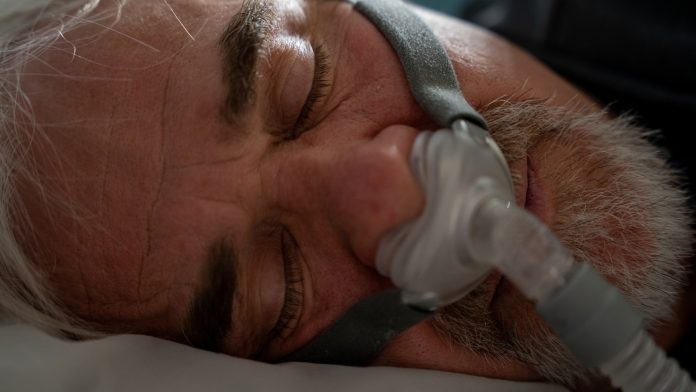
US researchers have discovered that CPAP machines may not be effective for older adults with sleep apnoea, suggesting other treatment options should be considered.
A study performed by researchers at the University of Missouri School of Medicine identified that Continuous positive airway pressure (CPAP) machines, the traditional treatment for moderative-to-severe obstructive sleep apnoea (OSA), may not be optimal for adults over the age of 80. Experts from Spain also collaborated on the project, including co-lead author M.A. Martinez-Garcia, MD, PhD, section head of pneumology from Hospital Universitario and Politenico La Fe in Valencia.
The investigation, titled ‘Effect of continuous positive airway pressure in very elderly with moderate-to-severe obstructive sleep apnoea pooled results from two multicentre randomised controlled trials, is published in the journal Sleep Medicine.
Analysing CPAP machines
Sleep apnoea is a sleeping condition in which people repeatedly stop breathing throughout their sleep and, if untreated, can result in severe health problems such as high blood pressure, heart problems, depression, and anxiety.
CPAP machines help alleviate the dangers of sleep apnoea by administering a stream of air into an individual’s airway through a mask and tube, which stops their airway from collapsing, enabling them to breathe continuously while sleeping.
For their investigation, the research team examined 369 people over the age of 70 with OSA, assigning half of the participants to receive CPAP therapy for three months. The team employed a range of metrics to evaluate both groups, such as a subjective measure of a patient’s sleepiness, the effect of CPAP machines on sleep-related quality of life, and how symptoms of anxiety and depression influence blood-pressure symptoms. Subsequently, the researchers subdivided the results by those older and younger than 80.
David Gozal, MD, the Marie M. and Harry L. Smith Endowed Chair of Child Health at the MU School of Medicine and senior author of the study, commented: “Our findings suggest that CPAP treatment is not as effective in patients over 80 years of age with OSA when compared to younger patients. We did not see any improvements in OSA-related symptoms, quality-of-life metrics, mood-related symptoms or blood pressure compared to the group that did not receive CPAP treatment.”
Why is the treatment not effective?
The team explained that sleep apnoea patients over 80 years old traditionally have more sedentary lifestyles, meaning other conditions may also exacerbate their poor quality or quantity of sleep that cannot be rectified with CPAP machines. Moreover, previous studies have suggested that patients older than 80 are less likely to adhere to CPAP therapy in the long term.
Gozal said: “Considering the growing population of elderly patients that is being referred for sleep consultation, large clinical trials are urgently needed to try to solve key questions related to the use of CPAP in patients over the age of 75 or 80. Those questions include: What type of elderly patient with OSA will benefit from CPAP? Is CPAP a cost-effective treatment for patients in this age group? And once CPAP treatment is initiated, should it last forever?”







